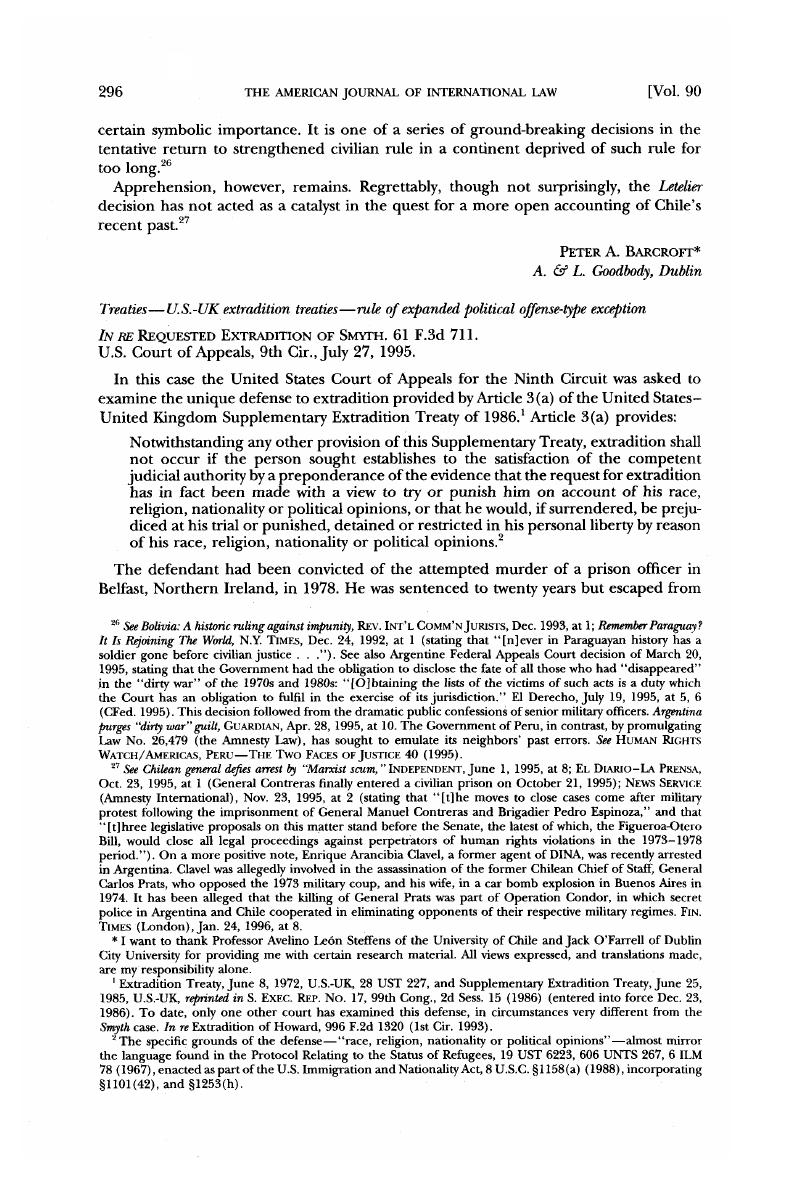No CrossRef data available.
Article contents
In re Requested Extradition of Smyth
Published online by Cambridge University Press: 27 February 2017
Abstract

- Type
- International Decisions
- Information
- Copyright
- Copyright © American Society of International Law 1996
References
1 Extradition Treaty, June 8, 1972, U.S.-UK, 28 UST 227, and Supplementary Extradition Treaty, June 25, 1985, U.S.-UK, reprinted in S. Exec Rep. No. 17, 99th Cong., 2d Sess. 15 (1986) (entered into force Dec. 23, 1986). To date, only one other court has examined this defense, in circumstances very different from the Smyth case. In re Extradition of Howard, 996 F.2d 1320 (1st Cir. 1993).
2 The specific grounds of the defense—“race, religion, nationality or political opinions”—almost mirror the language found in the Protocol Relating to the Status of Refugees, 19 UST 6223, 606 UNTS 267, 6 ILM 78 (1967), enacted as part of the U.S. Immigration and Nationality Act, 8 U.S.C. §1158(a) (1988), incorporating §1101(42), and §1253(h).
3 In re Extradition of Smyth, 863 F.Supp. 1137 (N.D. Cal. 1994).
4 U.S.-UK Extradition Treaty, supra note 1, Art. V(c) (i).
5 See, e.g., In re McMullen, No. 3–78–1899 M.G. (N.D. Cal. May 11, 1979); In re Mackin, No. 80 Cr. Misc. 1 (S.D.N.Y. Aug. 13, 1981), app. denied, 668 F.2d 122 (2d Cir. 1981); In re Doherty, 599 F.Supp. 270 (S.D.N.Y. 1986).
6 Supplementary Treaty, supra note 1, Art. 1.
7 If the governmental regime of a treaty partner so changed that the United States no longer perceived an interest to remain in a treaty relationship, the executive branch could terminate die treaty in conformity with its termination articles.
8 In re Extradition of Howard, 996 F.2d 1320, 1330 (1st Cir. 1993).
9 For an illuminating discussion of this issue, see Judge Selya's opinion in Howard, 996 F.2d at 1327. Judge Selya came to the conclusion that, “[i]n general, then, reviewing courts should apply the clearly erroneous standard to the trier's findings of fact in situations where article 3 of the Supplementary Treaty is in play.” Id. at 1328. Where, however, the lower court had insisted that evidence of general biases would bar extradition only if such biases could be shown to prejudice the defendant himself directly, Judge Selya determined that such a ruling was based upon the lower court's interpretation of the Treaty and should therefore be subject to de novo review.
10 61 F.3d at 719.
11 The phrase “Diplock system” refers to the truncated criminal process enacted into law after a report by the Diplock Commission: the Northern Ireland (Emergency Provisions) Act 1973, ch. 53 (Eng.). Under this Act, security forces may detain persons without reasonable suspicion of criminal activity, longer sentences are permitted, and certain procedural safeguards for defendants are abolished, including the right to a jury trial.
12 61 F.3d at 720.
13 Id. at 715.
14 Id. (summarizing Chairman Lugar, Senate Foreign Relations Committee debate on the Executive Report to the Supplementary Extradition Treaty with the United Kingdom, S. Exec. Rep. No. 17, 99th Cong., 2d Sess. 1, 4–5 (1986)).
15 61 F.3d at 719.
16 Again, for an excellent discussion of “four principles” that “rein in” the task of treaty interpretation for this particular treaty article, see In re Extradition of Howard, 996 F.2d 1320, 1330 (1st Cir. 1993).
17 id. at 1325.
18 Id. at 1327.


